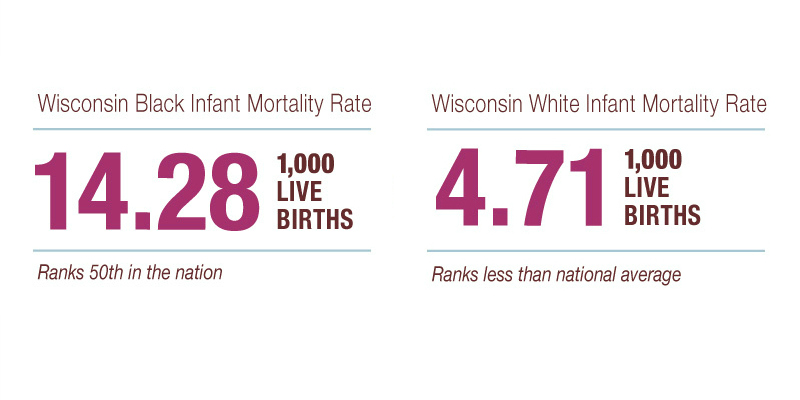With Wisconsin’s last-place national ranking, clearly there’s much work to be done to improve black birth outcomes here. Changing the statistics is no easy task, however, and a person’s health is determined by more than just the care they receive in a clinic or hospital. To tackle the problem, UW Health has made supporting black mothers to help prevent low birth rate and infant mortality a top priority. “We know this is not going to be something that changes quickly. We’re really in it for the long haul,” says Robin Lankton, director of UW Health’s community health improvement program.
To address socio-economic factors, UW Health routinely screens for food and housing insecurity. They’ve also started a CenteringPregnancy program, where women do prenatal visits in a group setting so they have a built-in peer support group. The program has two sites and is in talks with Harambee Village doulas to start another site at East Madison Community Center.
Addressing bias
UW Health is also implementing new staff training, both online and on site, to address bias in the clinical setting. Research has shown that the institutional bias black women face—inside and outside the health care system—can affect their physical health. That, in turn, can lead to greater risk factors going into pregnancy. “The idea is to hopefully reach all of our providers—and by providers I mean not only the physicians but nurses and anybody else that’s in the clinical area—social workers, medical assistants, receptionists, all of them,” says Shiva Bidar-Sielaff, UW’s chief diversity officer.
Recruiting care providers of color
When patients and providers are not of the same race, levels of trust and quality of communication tend to be lower, notes a recent study of perceptions of prenatal care. All of the mothers interviewed for this story say they only had one care provider of color. This was despite lengthy labors involving multiple shift changes and, in one case, a seven-day hospital stay.
UW-Madison School of Medicine officials hope that recruiting and retaining more diverse faculty members and students will help bridge that gap, Bidar-Sielaff says. UW Health also has partnered with Centro Hispano to train Certified Nursing Assistants and has a number of programs focused on interesting diverse youth in medical careers.
Read our feature story on “Empowering Mothers and Saving Babies” here.



